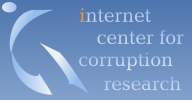
| Home → Corruption Perceptions Index → 2005 → Press Release |  |
| Home | |||
| Contact information | |||
| Research Area | |||
| Corruption Perceptions Index | |||
| 2009 and later | 2008 | 2007 | |
| 2006 | |||
| 2005 | |||
| 2004 | |||
| 2003 | |||
| 2002 | |||
| 2001 | |||
| 2000 | |||
| older indices | |||
| childhood days | |||
| Lecture and Workshops |
A Wake Up Call for the Bad Guys
The University of Passau compiles the 11th Corruption Perceptions Index (CPI) on behalf of Transparency International (TI).
Passau University, 18 October 2005: The new CPI index is out today: and judging from history, there will soon be a wave of international anti-corruption investigations based on its work.
In the past ten years the CPI has caused over ninety high-profile investigations around the world. The unequivocal message from these investigations: corruption is disastrous to societies. The very people who deserve the most help are the most victimized: the honest, the poor and the powerless. The honest are deprived because they do not participate in the shady deals; the poor are worse off because they cannot afford the costly bribes; the powerless are victimized because they cannot escape the extortionate demands of a greedy environment.
The CPI has become an important tool in fighting corruption. It has placed the fight against corruption firmly on the public agenda. It has helped spark major legislative reform. And it has helped change the popular perception that corruption was always "someone else's problem": Firms point to politicians as causing corruption; politicians mention unscrupulous private interests as being at the core of the problem; rich countries delegate responsibility to corrupt leaders of less developed countries; for poor countries the problem rests with bribe-willing multinationals. By putting countries in an integrity-league the CPI provides a simple sports-like logic. Whatever one may think about other countries in the league, one's home country is placed in a sequence of countries rather than being on top by force of xenophobic prejudice.
International investors also dislike countries perceived to be corrupt, fearing arbitrary decision making and a poor protection of their property. Countries with a higher score in the CPI, to the contrary, suffer less from capital flight and are preferred as safe havens. According to recent research, if a country were to improve its score in the CPI by 1 point (out of 10), foreign direct investment would increase by 15 percent.
Here is the bad news: the following countries, some of them very high-income, have deteriorated in the CPI since 1995. A reduction in the score (in descending order of significance) was observed in Poland, Argentina, Philippines, Zimbabwe, Canada, Indonesia, Ireland, Malaysia, Israel, Slovenia, Czech Republic, United Kingdom and Venezuela.
Prosperity is no guarantee against corruption. This is best seen in the oil-rich countries, scoring poorly in the CPI. For example, this year, for the first time, Equatorial Guinea enters the index. Its recent boom in oil extraction contrasts to its 152 position in the CPI, one of the lowest this year. This underpins that high income from natural resources produces ample opportunities for corruption, rather than helping development.
But there is hope. "Corruption is not a fate", argues Johann Graf Lambsdorff, the father of the CPI, "it prospers where business, society and politics turn a blind eye to its damaging effects".
Here is the good news; countries can improve their ranking in the CPI. They can "compete for integrity". The South Korea government had announced its goal to belong to the top-ten countries in the CPI. They improved their ranking from 47 in 2004 to 40 this year. This is one of the starkest improvements - and evidence that the right type of competition has been initiated by the CPI.
There are other signs of positive change, recent research at the University of Passau indicates significant improvements between 1995 and 2005 occurred (in descending order of significance) in Estonia, Italy, Spain, Colombia, Finland, Bulgaria, Hong Kong, Australia, Taiwan, Iceland, Austria, Mexico, New Zealand and Germany.
These are the places to look at when seeking good precedent. Given the international attention and support given to anti-corruption programs, the prospects of a sustainable reduction of corruption are higher than ever. Some poorer countries in the CPI are already indicative that poverty need no longer place a country in a downward spiral. Countries such as Chile, Barbados, Uruguay, Jordan and Botswana score rather well in this year's index. They are also prime candidates for improved economic and social development
In a recent study two authors, Lee and Ng, show that firms from countries scoring badly in the CPI are valued lower by international investors. If a country improves by 1 point in the CPI, the valuation of stocks of its domestic firms increases by roughly 10 percent. This illustrates that fighting corruption is not only a moral obligation - it is increasingly part of good business.
Details of Transparency International's Corruption Perceptions Index 2005 are available at: http://www.transparency.org/surveys/index.html#cpi and http://www.ICGG.org.